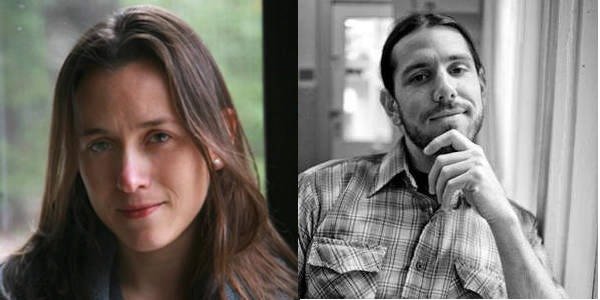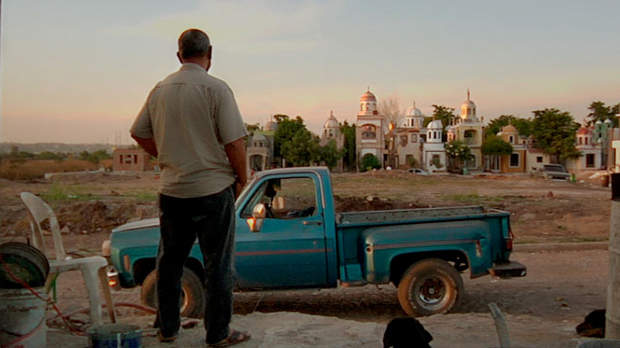 Back to selection
Back to selection
POV @ 25: Natalia Almada & Theo Rigby on the Personal and Political in Docs

In celebration of the 25th season of PBS’ groundbreaking documentary series POV, Filmmaker is this week running a four-part conversation series between two non-fiction directors with close ties to the show. A few weeks ago, award-winning documentarian Natalia Almada — whose new film, El Velador, is being aired as part of the 2012 POV season this Thursday — and Sin País director Theo Rigby, a photographer-turned-filmmaker, sat down to talk about a variety of issues that arise from their work. Through the course of the discussion, Almada and Rigby share where they’ve been, where they are now, and where they’re heading while dissecting different viewpoints of their craft.
In the third of four parts, the two directors talk about the balance between personal and political in their work.
Almada: Yeah, I would say that the personal is political and the political is personal. So I don’t see the divide in making one kind of work or another. I would say that the moment I begin working with the rest of the world through a camera there’s a power relationship that takes place, there’s everything from class to gender to culture to language. Everything comes into play with the camera kind of the intermediary between myself and the other person or the environment. And I see that activity as a political one. I don’t think it’s necessary to be discussing a social issue to be making political work.
Rigby: I had a similar reaction when POV made this great discussion on Sin País and they kind of break it down to the personal and political as two different things and two different ways to kind of contextualize those things. And I think they very much are interrelated and intertwined at all times and can’t necessarily be disengaged from each other.
I guess I find myself trying to take out what other people may perceive as political things, especially about immigration. I think certain kinds of people are triggered or see a kind of trigger and just shut down. And I very much want to make films that a wide swath of people can embrace all the way through. So in Sin País there are things, like deportation and immigration, that you could make a thousand different ways and I tried to sap out the politics as much as possible to make it a personal story. I want to depoliticize this issue of Latino immigration as much as possible with my work and try to make it, for the people that are watching it, as personal as possible. And then my other objective is all about trying to give people the ability to make their own story and make it even more like a diary; because if it’s not really hitting you in a personal way it doesn’t become real
Almada: I think you’re talking about political in two different aspects. One is in terms of content. Is the content in my film — deportation, drug trafficking — a social issue or is it politics, policy making, etc.? And I think that something that gets lost in the conversation, and is much more important, is what happens in the moment of filming your subject.
I am Mexican and speak Spanish, so it’s not like I’m a foreigner coming into the place when I go into the cemetery, but I am a woman and also blond and fair-skinned and all those relationships of gender and class, they’re so present in the moment of filming and they so affect what you are filming and how people react and their willingness — or unwillingness — to participate. I feel like, especially in a film like El Velador and most of my films, that I don’t take a political position or they’re done to be open-ended and not very conclusive. I say that my work is activist in the way that activism take place when I’m actually shooting. I don’t say, “Oh, I’m going to show the world a film that’s going to change the way they see the world or lead them to some kind of action,” and it’s not that I’m not interested in the audience but I think that that thing that happens when you’re shooting is so little understood and talked about and is very important in terms of understanding how we make films and what we’re seeing at the end.
I never thought about my work as a film about a person. [laughs] Definitely I thought about it as a film about a place. When I think about a title, which is really the last thing that came to a film, I gave it the name El Velador because of the function of the nightwatchman. I like the idea of, you know, his job is to watch and he’s like the clock of the cemetery and his eyes become our eyes and I think through him, he asks us to pause and watch what’s happening. And that was the reason I thought to name the film El Velador, much more so than as a portrait of a person. That said, I guess in contrast of making movies about animals or…even if it’s a place, it’s a place inhabited by living and dead people.
Rigby: When people watch the film do they ask a lot about the nightwatchman and his view? What happened to him? Do they kind of take that point and focus on that one person you really do get to meet most in your film?
Almada: Not that much. I mean I guess it’s a different kind of response because usually people want someone to say, “Hello, my name is…and this is my situation; this is why I’m worth filming,” in one way or another. They want people to explain their situation and it’s not really to me how we go about our lives; we don’t go around explaining ourselves and our reasons to be to the people around us.
So I think that’s one side to the answer and I think the other part is that, in a place or a situation of violence, people can’t speak. And so, we privilege dialogue as a way to understand and as the vehicle to give truth. And very often and especially in places of conflict, it is the least reliable method. So even of having access to filming the cemetery, I never could have gone in and asked, “Who’s buried here? How much did this mausoleum cost? Was he a big drug trafficker?” I would’ve gotten killed, I would’ve gotten the one guy with me killed and no one would’ve spoken to me. And when people are willing to talk in those kinds of situations, most often they give you kind of a cookie-cutter answer. They know what the media does.
Rigby: The undocumented community in the U.S. that I’ve been working with in the last seven or eight years can’t talk and is kind of voiceless for very different reasons. Reasons you can imagine, and it’s just putting yourself out there in a way that’s dangerous. You don’t talk about the fact that you don’t have papers, especially with people outside of your community. And it’s definitely a really interesting and true thing you said, Natalia, and is probably true for most documentary filmmakers that the most political thing you’re doing is actually not filming, but you being in the cemetery and filming or me being in the airport and filming this family’s excruciatingly hard and terrible and painful separation.
Next: POV @ 25: NATALIA ALMADA & THEO RIGBY ON TECHNOLOGY IN DOCS
Previous: POV @ 25: NATALIA ALMADA & THEO RIGBY ON IMAGE AND THE ROLES OF A FILMMAKER

